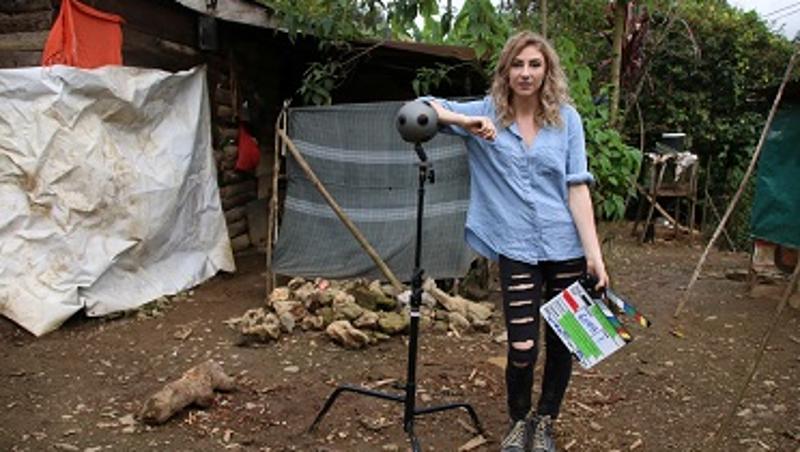
A virtual reality film (A Grandmother’s Love) shot in Guatemala by a Brisbane multi-media artist and filmmaker to highlight the work of the Global Brightlight Foundation (GBL) premiered yesterday during the Sundance Film Festival in Utah, USA.
Made by QUT Interactive and Visual Design graduate Jessie Hughes as part of the Oculus/Facebook 360 for Good Bootcamp for Filmmakers and Nonprofits, it aims to raise awareness of the foundation and its mission to bring solar power to the 1.3 billion people worldwide who live without power.
Founded in 2011, GBL has worked in nine different countries and deployed over 74,000 lamps, impacting the lives of 359,000 people. GBL is currently focusing its efforts in Guatemala and Peru.
The ‘360 for Good’ program is part of Oculus’ larger VR for Good program and brings together ten filmmakers and ten nonprofits to tell impactful stories through virtual reality.
Jessie Hughes and the other filmmakers were chosen from hundreds of applicants. As part of the program Oculus provided educational opportunities, funding, equipment, post production support, and one-on-one mentorship with industry veterans.
At 22 Ms Hughes was the youngest filmmaker and the only Australian chosen. She was flown to Facebook Headquarters in California for one-on-one mentorship from industry veterans and then paired with the GBL who she joined on a trip into Latin America.
“I’ve been fortunate enough to accompany GBL on two incredible trips to Guatemala, first to scout, second to shoot. The communities we travelled to and worked with were so full of happiness and energy, it made the whole process very special,” said Ms Hughes.
“Narrated by the voice of a loving Guatemalan grandmother, my film Amor de Abuela - translated to A Grandmother’s Love - invites its viewers into both the home and life of two unique children from the remote village of Tactic. The film follows the contrast between the benefits solar electricity has brought to the life of one of the friends and the absence of it within the other child’s life.”
“I’ve become so emotionally invested in these two families that the success of our film is incredibly important to me. I really support the idea of using VR as a tool to drive critical social change, truly being able to portray reality like never before. I’m very excited to see how developments in tech will shape social change over the coming years.”
The film, shot with a VR camera for full-spherical 360 x 180 degrees coverage, offers an insight into a life without light, raising awareness to the one in seven people in the world living without access to electricity.
Benjamin Bunker, CEO of the Global BrightLight Foundation, said the video was filmed in a small community near the town of Tac Tic, Alta Verapaz in the northern highlands of Guatemala.
“Many people in this community do not have access to electricity and those that do are subject to constant blackouts. This makes it almost impossible to perform every day activities after dark like studying, cooking, or spending time with family,” Mr Bunker said.
“With virtual reality technology, viewers will be able to truly experience how solar energy transforms the lives of families living without electricity.
“My hope is that this new film brings the need for practical and affordable solar energy solutions to the forefront and captures the impact that we are having on the lives of hundreds of thousands of people across the globe, one light at a time.”
Sundance is the largest independent film festival in the United States. The ‘360 for Good’ films, including the one made by Ms Hughes, are being premiered concurrently at Oculus House in Utah and will be viewed by millions on Facebook following the release.
Her selection for the ‘360 for Good’ program is the latest international accolade for Ms Hughes.
In 2015 she was one of just 10 female students worldwide to travel to New York for the Adobe International and Colossal Media ‘World’s Biggest Student Art Show’ while last year she was awarded the prestigious 2016 Technarte Artist Residency and spent one month on location at the remote Astronomical Observatory of the Roque de los Muchachos in Spain’s Canary Island group. Her sculpture ‘Soul of Sol – La Palma’, which married art and science, was later unveiled at the International Art and Technology Conference in Bilbao and later included in exhibits for the opening of the refurbished/expanded Tate Modern in London.
Amor de Abuela will be released to the public online over the coming months, posted to the Global BrightLight Foundation's Facebook page. The film can then be viewed as a 360 video on a smartphone or in a VR headset for the true immersive experience.
Donations can be made to the Global BrightLight Foundation at http://globalbrightlight.org.
Media contact:
Amanda Weaver, QUT Media, 07 3138 1841, amanda.weaver@qut.edu.au
After hours: Rose Trapnell, 0407 585 901, media@qut.edu.au




